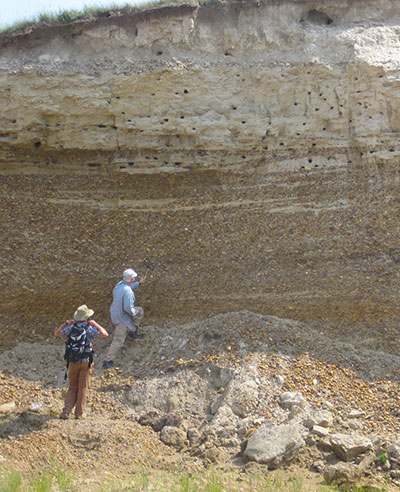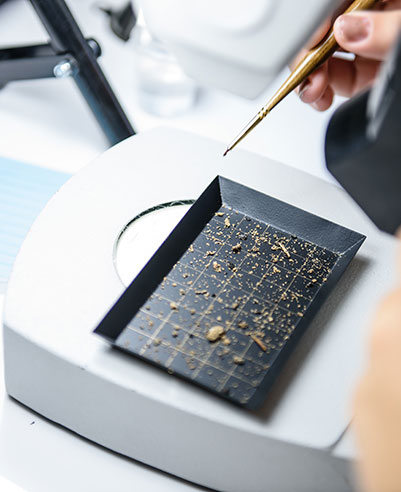Graduate Studies
Environmental Leadership
Our appreciation of the complexity and impact of human interactions with our chemical, physical, and biological environment is continuously expanding. As a result, we recognize that today’s students need to balance a scientific understanding of natural systems and processes with the ability to realistically evaluate and design for the role of people in these systems.
More than 1000 people have earned degrees from the Department of Environmental Engineering and Earth Sciences. Nationally recognized, our programs at Clemson offer our students the opportunity to integrate scientific and engineering perspectives through our diverse range of programs.
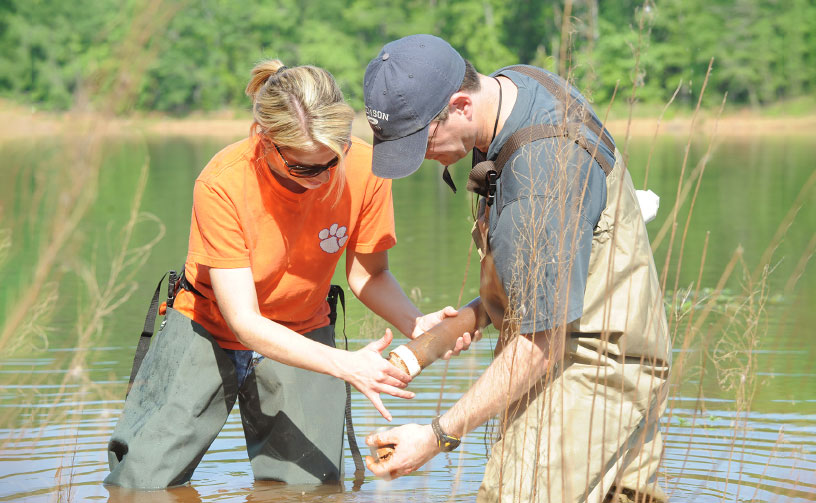
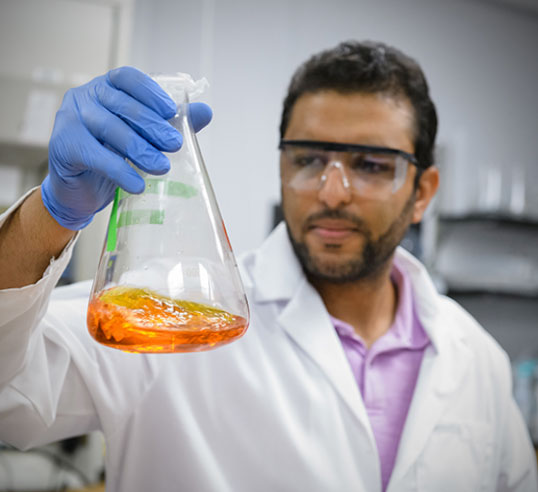
Research
Our faculty pursue a diverse range of environmental research topics. Current research areas range from investigating the behavior and management of pollutants in the environment to studying the physical properties of rocks and sediments that are the sources of resources, to providing long-term energy solutions through the design of sustainable systems for biofuel production. Our students benefit from the mentorship of a major advisor in planning and performing a research project compatible with their interests.
EEES Research Theses & DissertationsFacilities
To provide students with the optimal resources for producing cutting-edge research, our facilities are spread over two campuses: Brackett Hall on the main Clemson University campus and the Rich Lab at the Clemson Advanced Materials Research Park. In addition to an extensive set of analytical and computational facilities at these locations, our department also maintains an inventory of field equipment for short or long-term deployment at field sites, such as at our instrumented watershed in the Clemson Experimental Forest.
- Rich Laboratory
- Brackett Hall
- Biosystems Research Complex
- Clemson Experimental Forest
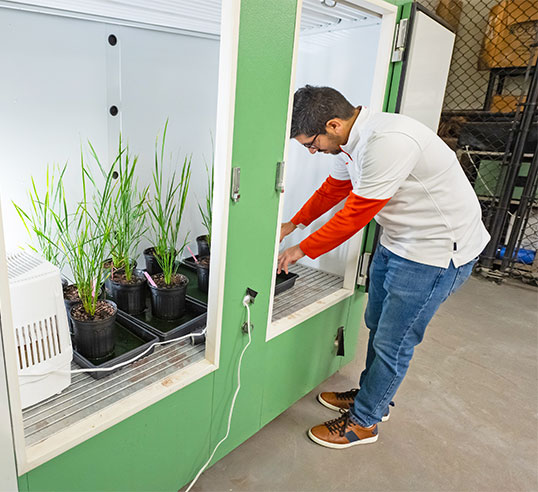
Areas of Study
The graduate degree programs in the Department of Environmental Engineering and Earth Sciences offer a wide array of options for fields of study. For example, there are five focus areas for the M.S. in Environmental Engineering and Science: Process Engineering, Environmental Chemistry, Surface and Subsurface Processes, Sustainable Systems and Environmental Assessment, and Nuclear Environmental Engineering and Science. Students who seek an M.S. in Hydrogeology often focus on advanced modeling techniques applied to the fate and transport of contaminants in groundwater. With Biosystems Engineering, M.S. degree candidates focus on ecological engineering and bioprocess engineering. At the Ph.D. level, the degree programs are highly individualized to a student’s research interests and career goals. We foster a highly interdisciplinary academic environment, with considerable synergy among the degree programs. Our programs have received national recognition for their quality and their comprehensive curricula.
- Biosystems Engineering
- Environmental Chemistry
- Environmental Fate and Transport
- Hydrogeology
- Environmental Health Physics
- Environmental Radiochemistry
- Process Engineering
- Sustainable Systems and Environmental Assessment
Academic Programs
Our range of M.S. and Ph.D. programs creates a unique interdisciplinary perspective that prepares students as leaders in government, industry, and academia. The majority of our master's graduates work in consulting firms. Some firms specialize in environmental remediation or water and wastewater treatment plant design, while others are general engineering firms. Our doctoral students also find opportunities in consulting companies and utilities as well as in universities and research laboratories such as the Department of Energy national labs.
Biosystems Engineering M.S./Ph.D.
The Biosystems Engineering graduate program within the EEES department is designed to prepare graduates for leadership, creative accomplishment and continued professional learning.
Environmental Engineering & Science M.S.
An online option is available for this degree program.
Environmental Engineering and Science is concerned with the characterization and control of environmental pollution. Five focus areas allow for specializations.
Environmental Engineering & Science M.S.
Focus Area: Environmental Health Physics
Environmental Health Physics is designed to address broad environmental issues by providing the training needed to protect human health and the environment from ionizing radiation.
Environmental Engineering & Earth Sciences Ph.D.
Environmental Engineering and Earth Sciences is in-depth in nature, consisting of coursework in several areas of the basic and applied sciences, as well as the engineering sciences.
Hydrogeology M.S.
This interdisciplinary program provides students an opportunity to investigate a wide range of problems based on Hydrogeology through practical skillset and fundamental knowledge.
B.S. to M.S. Programs
B.S. to M.S. allow students to complete a master's in 5 years by combining the degree requirements. Students must consult with an advisor prior to beginning the combined program.
Preparing for Grad School
The Department of Environmental Engineering and Earth Sciences currently has more than 100 graduate students across several graduate programs. Our graduate population hails from all over the United States as well as Mexico, Thailand, Vietnam, China, India, Poland, Ghana, Nigeria, and Turkey. Academic backgrounds include chemistry, geology, physics, environmental engineering, civil engineering, chemical engineering, and mechanical engineering.
We have a Frequently Asked Questions page that pertains to admission requirements, test scores, and financial aid. Please view the topics and reach out if you need additional assistance.
EEES Graduate FAQ-
Graduate Assistantships
It is common for students who are teaching assistants during their first year of graduate study to switch to a research assistantship for their second year. Graduate assistants pay a reduced academic fee (tuition) that is the same for both resident and non-resident students. Selection of financial assistance recipients and the amount awarded is made by the graduate faculty based on many factors, including undergraduate transcripts, recommendations, science and math background, and (for international students) English language proficiency.
Teaching Assistantships Teaching assistants (TAs) play an important role in the department. TAs may be required to teach laboratories that parallel introductory courses in geology and physical science or assist with various other courses. In general, TAs work approximately 20 hours per week, which includes preparation, teaching, and grading. Most TAs teach 3 two-hour laboratory sections per week. Each year an award is presented to the outstanding graduate teaching assistant in the department.
Research Assistantships Research assistants receive financial support while performing research on a specific project. Usually, but not always, this work coincides with an RA's thesis research. The responsibilities of RA's vary according to the specific grant from which they are being paid. In many cases, the research expenses of RA's are paid in addition to a stipend and reduction in overall tuition.
-
Graduate Fellowships
Two major types of fellowships are awarded: those that provide full financial support and those that augment an assistantship. Fellowships include Graduate Alumni Fellowships, University Research Fellowships, and George R. MacDonald Fellowships are Universitywide awards administered by the Graduate School. These awards of $5,000 each for the academic year are made competitively to nominees selected by the departments. Scholarly potential and academic excellence are the sole criteria for the awards.
South Carolina Graduate Incentive Fellowships $5,000 for master's students or $10,000 for doctoral students, are available to minority graduate students. These awards are renewable. Master's students must be citizens of South Carolina. Preference is given to new applicants and those who commit to remaining and being employed in the state for two years. The Graduate School administers these fellowships.
OCRWM Fellowships Clemson University is one of only 18 universities nationwide from which graduate students may apply for fellowships from the OCRWM of the U.S. Department of Energy. Technical emphasis areas include earth science (hydrology-geology) and engineering. Contact the Graduate Program Coordinator for more information or if you would like to be considered for the OCRWM Fellowship.
Scholarship Opportunities
- National Science Foundation (NSF): Graduate Fellowships
- National Science Foundation East Asia and Pacific Summer Institutes for U. S. Graduate Students
- U.S. Department of Energy: Multiple Opportunities
- Oak Ridge Institute for Science and Education (ORISE)
- National Oceanic and Atmospheric Administration (NOAA)
- Graduate Fellowships for STEM Diversity
- American Association of University Women (AAUW)
- Society of Women Engineers (SWE)
- SETAC / EA Engineering Jeff Black Award
- SETAC / ICA Chris Lee Award for Metals Research
- American Water Works Association (AWWA) Fellowships
- Brown and Caldwell: Dr. Wesley Eckenfelder, Jr. Scholarship & Minority Scholarship
- Sigma Xi: Grants-in-Aid of Research
- Sigma Delta Epsilon: Graduate Women in Science
- Ford Foundation: Fellowships Programs
- Morris K. Udall Foundation
- Environmental Research and Education Foundation
- Capital City Fellows Program (policy program in D.C.)
- Organization of American States (OAS): Graduate Fellowships
- Graduate Women International
- National Research Council (NRC): Post-Doctoral Fellowships
Additional Resources
International Education Financial Aid
IEFA is the premier Internet resource for financial aid information for international students wishing to study in a foreign country. At this site, you will find the most comprehensive listing of grants, scholarships, loan programs, and other information to assist students in their pursuit to study abroad.
http://www.iefa.org/Association of Environmental Engineering and Science Professors (AEESP)
The AEESP posts position announcements for postdoctoral associates and tenure-track faculty regularly.
http://www.aeesp.org/Fellowship information and career advice
This online magazine provides weekly updates on fellowship and grant information across the sciences and engineering disciplines. There is also information about job markets for people with advanced degrees in science and engineering. There is information appropriate for postdoctoral associates, too.
https://www.science.org/careersFederal Stafford Loan The Federal Stafford Loan has extended loan limits for graduate students and is available to most students regardless of income. US citizens and eligible non-citizens can apply for the Federal Stafford Loan by completing the Free Application for Federal Student Aid (FAFSA). The suggested deadline to apply is April 1 for the following Fall semester. Further information and application forms are available from the Office of Student Financial Aid, G01 Sikes Hall, Box 345123, Clemson, SC 29634-5123.
-
Required Application Materials
All students applying for graduate study in the Department of Environmental Engineering and Earth Sciences (EEES) must have a baccalaureate degree and provide evidence indicating an aptitude for continued studies at the graduate level. All official graduate applications must include:
Scores for the GRE (General Test) are not required for admission.
- Official graduate school application form (completed online)
- Unofficial transcripts (undergraduate plus graduate, if applicable)
- resume
- Statement of purpose in which applicants describe their education, past research and/or work experience, and why they want to pursue study in their selected graduate program at Clemson University
- Recommendation letters
- English Language Proficiency test scores (international applicants only)
Applicants are not required to report GRE scores.
Descriptions of the individual graduate programs in EEES include any additional instructions specific to that degree curriculum. We consider the entire official application package when deciding on suitable candidates for graduate study.
Resume Your resume should be a brief highlight of your experiences and education. Sample resumes and helpful tips can be found on Clemson University's Center for Career and Professional Development website.;
Statement of Purpose Because the decision to admit applicants to a graduate program in EEES at Clemson University is based on many diverse factors, we would like to get to know you as well as possible. Accordingly, we ask that you submit a one- to two-page essay (Statement of Purpose) to tell us about yourself and the experiences that helped shape you and your life's goals and professional aspirations. Include an indication of your preferred area of specialization and research in the field of environmental engineering and science, biosystems engineering, hydrogeology, or the Earth sciences, and state why you are interested in that particular field.
Recommendation Letters We require two letters of recommendation for all M.S. degrees and three letters of recommendation for all Ph.D. degrees. We carefully consider letters of recommendation from professors from your undergraduate and master's education. The letters should be from evaluators who are familiar with your academic performance and any research experience that you have. The letter writers should know you well and be able to write about your skills, talents, experiences, and abilities. A recommendation letter from a supervisor from any work experience can also be helpful, but do not include more than one letter from a non-academic evaluator.
English Language Proficiency For international applicants, an English language proficiency test is required – we currently accept the following tests (minimum scores in parentheses): TOEFL (90), IELTS (7.0), PTE (61), or Duolingo (115).
We encourage visits to the Department or phone calls, or emails with faculty who share your research interests. Please contact Barbara Smith if you are interested in visiting.
-
Application Overview
No application fees and no GRE scores are required.
All applications for graduate programs are first submitted to the Clemson Graduate School. From there, entries are forwarded to the department associated with the degree track to determine eligibility for the program. Typically, candidates admitted to the department will choose a research advisor in the first term of residence; however, students with a substantial interest in a particular study area are encouraged to indicate this on their application and contact individual faculty members to discuss potential research options.
To be considered fully for financial assistance beginning in the Fall semester, completed applications for graduate study should be received by January 15, though applications may be submitted at any time. Applications received after January 15 may be considered for financial assistance, depending upon the availability of funds. Notice of acceptance to the program and financial aid offers are typically given to new students in March-April for fall enrollment. Students are typically informed of acceptance for the upcoming fall term by the end of April.
NOTE: In general, the majority of students are admitted in the Fall semester. Admission for the spring and summer semesters is possible, but students are less likely to be considered for an assistantship. Applications must be submitted by January 15th to receive full consideration for financial assistance. To be considered, all supporting materials (e.g., recommendation letters and unofficial transcripts) must be received by the deadline. The earlier you apply, the more likely you will be considered for an assistantship.
Apply | Graduate School -
Program Coordinators
If you have questions about our programs, financial aid, or any part of the application process, we encourage you to contact us!
For general questions or help with the application process, please contact our Student Services Coordinator:
Barbara Smith
☏ 864.656.3278
⇢ L. G. Rich Environmental Research Laboratory
342 Computer Court
Anderson, SC 29625
✉ barbar2@clemson.eduProgram Coordinators
For specific questions regarding our programs contact the appropriate graduate program coordinator for the area you are interested in pursuing.
Biosystems Engineering, M.S. and Ph.D.
Dr. Christophe Darnault
☏ 864.656.1398
✉ cdarnau@clemson.eduEnvironmental Engineering & Science, M.S.
Environmental Engineering & Earth Sciences, Ph.D.
Dr. Mark Schlautman
☏ 864.656.4059
✉ mschlau@clemson.eduHydrogeology, M.S.
Dr. Larry Murdoch
☏ 864.656.2597
✉ lmurdoc@clemson.edu
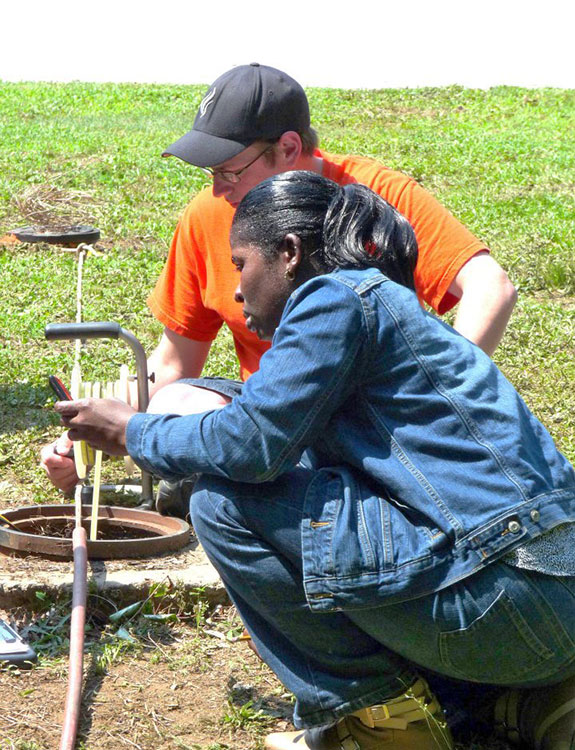
Expanding Experiences
Learning about current advances and research developments in various areas of environmental engineering and science through hands-on work and presentations is an important part of our curriculum.
Hydrogeology Field Camp
The Clemson Hydrogeology Field Camp is designed to give a working knowledge of field hydrogeology methods and provide the opportunity to use them in several hydrogeologic settings. Instructors from Clemson lead the course, but other geologists, hydrogeologists, scientists from other universities, and consulting companies lead trips and exercises in their particular expertise.
You should have at least completed your sophomore year in geology or a similar bachelor's degree program. We strongly recommend, but do not require, that you take a class in hydrogeology before coming to field camp. You will get more out of the field camp experience if you know the basics.
Departmental Seminars
During the fall and spring semesters, the EEES Department sponsors a weekly seminar on Friday at 2:30 p.m. EEES students and faculty give presentations about their research or other topics of interest to the department. Invited speakers from industry, government, and other academic departments are also included. The seminar is held in the Rich Laboratory auditorium in the fall and on campus in spring. Suggestions for speakers are always welcome. Please send ideas to the faculty member coordinating the seminar.
Doctoral students are required to give at least one seminar each year. EES 9610 is offered both summer sessions in Rich 150 to provide an opportunity for all doctoral students to present.
